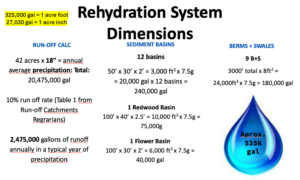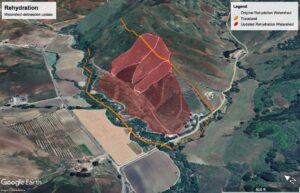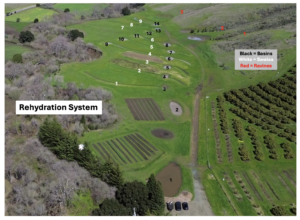Project Overview
Information Products
Commodities
- Fruits: berries (other)
- Nuts: walnuts
- Additional Plants: trees
Practices
- Crop Production: water management
- Education and Training: demonstration
- Production Systems: agroecosystems
Summary:
Past practices have contributed to economic growth at the expense of soil and water conservation, as indicated by degraded lands and creeks. There is opportunity to reverse land degradation and dehydration via sustainable shifts in agricultural land management. Climate change exacerbates the need for on-ground actions to occur at a time/ scale more rapidly than the current pace in order to optimize sustainable agriculture production.
This proposal demonstrates how integrated management shifts support land and water restoration and produce commercially viable crops. Current annual water use is ~5M gal- this regime is not sustainable, and needs to shift from water resource strain to agro-ecosystem production. The water regime needs to be well studied to provide the technical input required to design, and implement specific water management applications.
A basic understanding of the current water balance, opportunities for rehydration, and annual runoff (>700k gal) for 3 drainages have been approximated. Applying diverse solutions (conceptualized in the form of berms, swales, and recharge basins) can help infiltrate up to ~500k gal water per year. These treatments give an opportunity to measure and monitor rehydration efforts (see attachments).
This project has been shared across several environmental and agricultural based networks and posted on local community boards. Participants and visitors have included:
- Toro Creek Watershed Neighbors
- Upper Salinas Las Tablas Resource Conservation District staff (USLT RCD),
- City Farm San Luis Obispo Staff,
- Cal Poly Environmental Science Professors,
- Santa Cruz Permaculture,
- Creek Lands Conservation Staff,
- Local environmental freelance grant writers,
- San Luis Obispo (SLO) County farmers and ranchers,
- Local libraries: SLO and Morro Bay (MB)
- Local ecological environmental landscape architects
- Local hydrologists
- Local herbalist program
There were many tours and conversations held on the land with local interested parties. Additionally, Traceland held two workshops to share and educate the stakeholders developed over the grant period. One on rehydration and restoration, on April 5th, 2024 and a second on oak and acorn food on site November 11th 2023.
Feedback from the workshops were overwhelmingly positive and suggests growing awareness and interest in agro-ecological solutions that contribute to the resilience of watersheds and the food system as a whole.
Project objectives:
Objective 1: Water management accounting (January 2023 - December 2023)
- An assessment of the consumptive water use of the Trace Farm to reduce the water footprint and off-set pumping from the agricultural riparian well that is hydrologically connected to stream flows in mainstem Toro Creek. Test the degree of hydraulic connection so that streamflow benefits can be quantified. Develop conceptual level concepts for water conservation, streamflow enhancement, and benefits to riparian floodplain habitat;
Objective 2: Expand agricultural operations onto valuable Class 1 alluvial soil and simultaneously restore native habitat across approximately 12.5 acres (Planning 2022, earthworks May and July 2023, Monitoring November 2023 – April 2024, Planting March 2024, Workshop April 2024, Planned remediation Summer 2024)
- We developed a master plan to establish native-dominant plant communities on a disconnected flood plain and adjacent hills to enhance botanical biodiversity and increase wildlife habitat complexity. The plan integrates productive agricultural ecosystems (e.g. edible landscape) that emphasize the diversity and functions of natural ecosystems as well as soil health elements such as mulch application, reintroduction of mycorrhizal mycelium, and evaluation of soil minerals.
- We held one workshop on rehydration and restoration agriculture April 2024
Objective 3: Reduce soil erosion and stream bank collapse 0.5 miles of Toro Creek (Planning 2022, earthworks May and July 2023, Monitoring November 2023 – April 2024, Planting March 2024, Workshop April 2024, Planned remediation Summer 2024)
- We assessed the drainage, and creek bank to determine where to divert stormwater and mitigate existing channel incision and erosion.
Objective 4: Capture > 500k gal stormwater run-off (similar timeline as Objective 2)
- We designed a rehydration system based on keyline farming principles using berms, swales, basins to capture runoff water.
- We held a keyline farming field day to assess the dynamics of water infiltration and its multiple benefits in relation to semi-arid mediterranean climates
Objective 5: Bio-sequester atmospheric CO2 (planting 73 trees)
- First we assessed the carbon emissions from the earthworks.
- Secondly we estimated the time required for native and foreign oaks to bio-sequester the CO2 emitted during excavation.
Objective 6: Research and develop acorn food production as a high-value, gluten-free, delicious flour and foodstuff (Acorn food workshop Fall 2023, First oaks planted Spring 2024)
- We collected acorns from red, white and intermediate section native oak trees, taste tested and made several recipes.
- We carried out literature reviews on acorn food practices globally and visited two active acorn producing regions and businesses in the Iberian Peninsula of Europe.
- We identified several processing steps involved in producing acorn flour and potential machinery that would be involved to produce it commercially.


